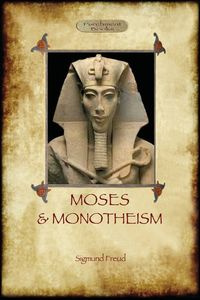Moses and Monotheism - Freud Sigmund
In 1938 the 'father of Psychoanalysis' Sigmund Freud found himself an exile in London, a victim of Nazi persecution. But Britain's religious freedom at last gave Freud the opportunity to complete a work he had withheld from the public during his time in Catholic Vienna - a study on the biblical Moses and the origins of Judaism. 'Moses and Monotheism' was published in August 1938 to a storm of criticism. Freud announced that Moses, the man who led the Israelites out of Egypt, was not a Hebrew, but instead an Egyptian Prince and a follower of Akhenaten - the 'Heretic Pharaoh' who had tried and failed to force upon the Egyptians his own form of Monotheism. Freud claimed that, angered by the strict laws Moses tried to impose, the Hebrews had eventually murdered their Egyptian saviour. But 'Moses and Monotheism' is much more than an early example of 'alternative history'. Freud saw Moses' insistence on an invisible God as a defining moment in history, freeing mankind from the world of matter. It meant that 'sensory perception was given second place to what may be called an abstract idea - a triumph of intellectuality over sensuality', an intellectual emancipation that allowed for a flowering of human potential in both the arts and science.
EAN: 9781909735187




In 1938 the 'father of Psychoanalysis' Sigmund Freud found himself an exile in London, a victim of Nazi persecution. But Britain's religious freedom at last gave Freud the opportunity to complete a work he had withheld from the public during his time in Catholic Vienna - a study on the biblical Moses and the origins of Judaism. 'Moses and Monotheism' was published in August 1938 to a storm of criticism. Freud announced that Moses, the man who led the Israelites out of Egypt, was not a Hebrew, but instead an Egyptian Prince and a follower of Akhenaten - the 'Heretic Pharaoh' who had tried and failed to force upon the Egyptians his own form of Monotheism. Freud claimed that, angered by the strict laws Moses tried to impose, the Hebrews had eventually murdered their Egyptian saviour. But 'Moses and Monotheism' is much more than an early example of 'alternative history'. Freud saw Moses' insistence on an invisible God as a defining moment in history, freeing mankind from the world of matter. It meant that 'sensory perception was given second place to what may be called an abstract idea - a triumph of intellectuality over sensuality', an intellectual emancipation that allowed for a flowering of human potential in both the arts and science.
EAN: 9781909735187

